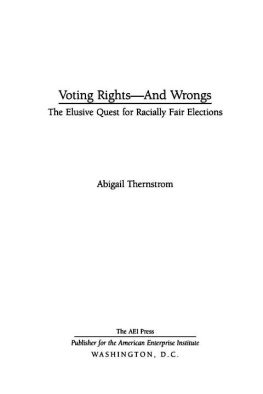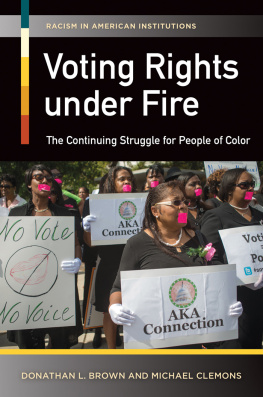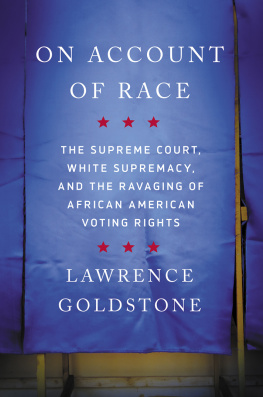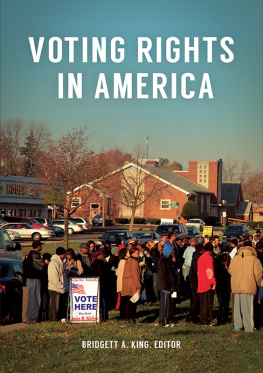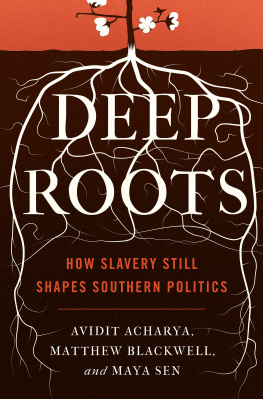The Elusive Quest for Racially Fair Elections
Abigail Thernstrom


To Amy Thernstrom and Michael Callahan, two wonderful people who married into our family. With much love.



Contents
Xi
Xiii
I
III
Acknowledgments
This book would not have been possible without the support of the American Enterprise Institute for Public Policy Research (AEI), and I am grateful to its long-time president, Chris DeMuth, and his recent successor, Arthur Brooks, for their confidence in my work. Kim Dennis, former director of the National Research Initiative (NRI) at AEI, provided the financial support and encouragement essential to the book's inception. Her successor as head of the NRI, Henry Olsen, drew on his deep knowledge of American politics to make perceptive suggestions that helped shape the book in important ways.
Samuel Thernstrom, director of the AEI Press, not only provided incomparable editing, but also talked through almost every substantive point, enriching my own understanding of the subject in the process. Whatever strengths this book possesses are due in great part to his indispensable help. I am indebted as well to his assistant, Laura Harbold, who provided inestimable assistance with production of the book, to Lisa Ferrarro Parmelee for her meticulous editing, and to Susan Burnell for her careful review of my legal citations.
Several people generously read the manuscript in whole or in part. In their swift but painstaking reviews, J. Christian Adams, Michael Carvin, Roger Clegg, Daniel Lowenstein, and Hans von Spakovsky caught errors and made valuable suggestions, for which I thank them.
I learned a great deal from the many excellent scholars whose work is discussed throughout the book. When I wrote Whose Votes Count? more than twenty years ago, there was very little academic writing on minority voting rights; today a rich and varied literature exists, from which I drew extensively. Richard Hasen's immensely useful ElectionLaw listserve has been a great source of information and insight, and I am indebted to Rick for his indefatigable energy in posting the latest election law news every day.
As always, Stephan Thernstrom read every word and then read them again ... and again. He is my wonderful colleague, and a husband without whom life would be unimaginable.
Foreword
Juan Williams
It is a simple but revealing joke: Even paranoids have enemies!
That one-liner is pretty accurate in revealing a common mindset among black Americans. Yes, we now know a black man can be elected president in this white-majority country. Yes, even the head of the overwhelmingly white Republican Party is currently a black man. And, yes, a vigilant Congress, on the watch for any sly tactic to diminish black voting rights, has repeatedly extended an emergency provision of the 1965 Voting Rights Act, long after it was intended to expire.
But ... even paranoids have enemies.
So, when the last extension of that provision-section 5-of the Voting Rights Act was about to expire in 2006, it sparked a frenzy of fear on black talk radio, in black newspapers, and, particularly, on the Internet. The basic message just two years before a black man won the White House-was that black people faced the possibility of losing their right to vote.
Section 5 was originally intended as short-term insurance against any sleight-of-hand changes by racist election officials looking to subvert newly established protections for minority voters. In a nation where blacks had been kept from voting with bogus literacy tests and interpretive questions from registrars that had no real answers-such as the infamous, "How many bubbles in a bar of soap?"-section 5 gave the government a way to deal with new forms of such blatant attempts to deny black people their voting rights. It was targeted at the nine states of the Old Confederacy with their history of voter intimidation and poll taxes. Now, more than forty years later, in response to a simple debate about the need for yet a fourth extension of section 5, dire voices claimed that any thought of doing away with it or trimming it back amounted to the end of the whole Voting Rights Act. Some announced that black people would be kept from voting.
Please keep in mind that the most important protections of the Voting Rights Act do not require reauthorization. And note that the Fifteenth Amendment to the Constitution, establishing the right for black men to vote, is also chiseled in stone into American jurisprudence. The Voting Rights Act and the Fifteenth Amendment are fixtures in law.
The rumor of the death of the Voting Rights Act often was tied to charges of voter suppression during the 2000 election. The Clinton administration's Justice Department investigated and did not find the evidence to make a case based on voting rights violations or voter suppression. But that did not quash the conspiracy theory. It fell into line with other racial conspiracy theories, including such enduring whispers as the one that has the government giving AIDS to black people.
Nervousness about the end of section 5 also led to questions about Republican efforts to pass laws requiring voters to have government-issued identification. While there have been few extensive cases of voter fraud under existing law, federal courts have generally found voter identification to be a reasonable safeguard against the possibility of it. Nevertheless, that move was seen by the conspiracy-minded as a cagey way for Republicans to depress votes for Democrats by turning away older, low-income, mostly minority voters who are more likely to be Democrats and less likely to have such identification.
To anyone but those most absorbed with this fight, there is the temptation to dismiss all the racial paranoia as just a collective mania. You could write it off as a sad reminder that black Americans have had real enemies at their backs for most of American history. A touch of paranoia is understandable when past generations of your people have been literally hounded, enslaved, and even lynched. Recent elections in the United States have seen fliers arrive in black neighborhoods with the wrong date for voting or inferences about bill collectors waiting to see who votes so they can have people arrested.
When it comes to paranoia, we black people know about ghosts as we pass along stories of Night Riders and the KKK.
You might even explain current outbreaks of paranoia as the cost of ongoing twenty-first-century stereotyping, in which blacks are most often seen on TV in music, and in movies as hyper-violent criminals, rappers who imitate those gangsters and glorify their lifestyle, or comics who think it is fall-down funny to use the N-word. That barrage of negativity is enough to inspire my own paranoia about the way the rest of America sees black people.
So, all this paranoia can be understood as a leftover psychological discomfort erupting out of America's troubled racial history, and nothing more.

